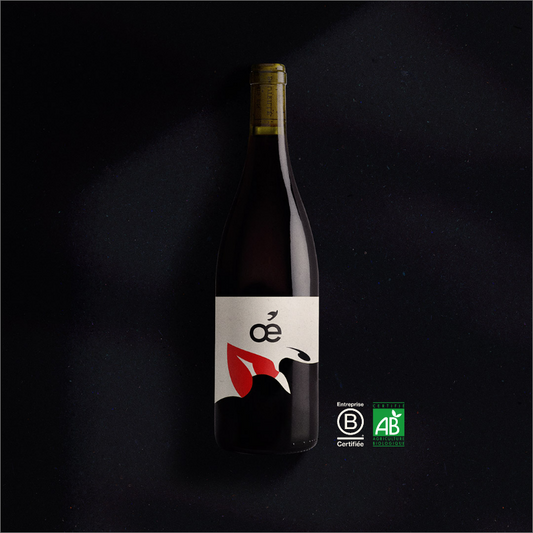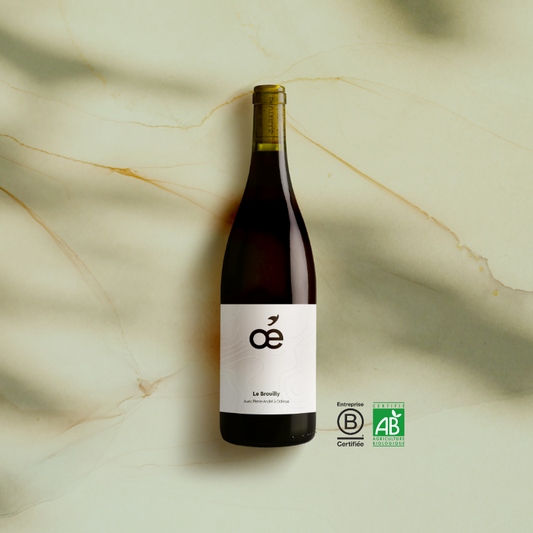For the past few weeks, we have had the pleasure of offering you organic Oé wines in all HUDI living spaces . In three sentences, HUDI is a B Corp certified company , with 4 sites in Paris and 1000 events per year . The team has become our partner and we present to you today their commitments thanks to our exchange with Stéphane, Responsible for the positive impact.

Tell me about hudi in a few sentences?
“ HUDI stands for Human and Digital . The company was created in 2017 and was labeled B Corp in 2019. We are active in 4 locations in Île-de-France and our basic observation is that the quality of canteens for employees is not is almost never there, the places are gloomy, not very comfortable, badly soundproofed, badly designed, the places are underused.… In short, it doesn't really make you want to go there.
Based on this observation, we had the idea of creating a place open all day for professionals and individuals to serve quality food . We started from the principle that if you have a good time during your breaks and eat good and healthy food, you are better at your job.”
What commitments does hudi make to its customers?
“We have a real desire to reduce our footprint and create a circular economy , an ecosystem on which our customers can count to respect environmental and societal commitments .
All delivery jars are recorded. We have a takeaway offer that is compostable and composted and that tomorrow will be a returnable offer or purchased by the customer in glass. We sort our waste, we recycle our coffee grounds to make oyster mushrooms in partnership with Up Cycle . We also work with Les Alchimistes or Lemon Tri . The idea is to create an ecosystem that is as responsible as possible with local, seasonal products and ⅓ of plant or plant-based foods.
We work with people recognized for the quality of their products, such as Yves-Marie le Bourdonnec, who provides us with good matured meat. For fruit and vegetables, we go through the Primeur Witness of the Future. We only buy fresh fish, and since there is no fishing on weekends, we do not offer fish on Mondays in the restaurant.”
How does hudi work?
“In the coffee shops , you can have a continental breakfast, drink LOMI coffee prepared by a real barista, eat fresh pastries that we offer in partnership with local bakers. We are open from 8 a.m. to 7 p.m. , for lunch or a break during the day. For lunch, you can take away or eat at the restaurant, we don't cook frozen products, only raw products worked by a real team: a chef, a sous-chef, a pastry chef, a vegetable cook, divers... In the evening, anything that has not been consumed can be ordered with Too Good To go . With all that, we also offer a concierge service to our customers for a convenience store, a laundry or a place to drop off packages.”
What are you putting in place for B Corp?
“Already all the little things we just talked about on sorting, deposit, local and seasonal products, etc. And if not on the salary side, we have a decentralized model. Value is created at each location. Each place is different: the chef chooses his recipes, the products he wishes to highlight, etc.
We are also trying to move the lines so that those who do not have enough to eat can benefit from meals with the necessary calories and do not only have leftovers or expired products. Currently, there is no association that can come and collect everything that is left at the end of the day and on top of that we have volumes that vary from day to day. It's not easy to have a lasting partnership with an association on a hudi site. We are gradually managing to set it up with one of our sites which does a lot of events: we activate the Linkee association which distributes meals in Paris intra muros when we know that there will be leftovers. We would like to have a process where we freeze what we have in excess and when there are enough dishes with good nutritional value, an association like linkee could come and collect them to distribute them. Today, the anti-waste system in France is not completely established. There are plenty of things to do.
What we liked about Label B Corp is that it is open and transparent. Being part of this community allows us to undertake a 360° approach. We like this multidimensional side: our way of working with our customers, our shareholders, partners and employees. It is a difficult label to fill and to obtain. We don't want to be the best, we just want to do the best, improve every day to be the most responsible. This is our daily challenge.”
Tell me a bit about your job, Positive Impact Manager ;)
“The idea is to make everything we do at hudi positive . Take the subjects one by one and see how we can put them in place while respecting the environment and the stakeholders with whom we work. We didn't just want to be “ISO” and be good at a single subject, we want to do everything in the best possible way. For example, we convinced our lessor to use renewable energy, we had a kitchen that didn't correspond to our mode of operation, so rather than throwing it away, we gave it to a young cook. We choose the energy classes of our materials. Basically, my job is to find all the most responsible alternatives and put them in place!”
Do you have an anecdote to tell us?
“Yes, at the start of the adventure, when we implemented selective waste sorting and bio-waste management, I had to go out into the field to explain everything to the employees. I thought it would go perfectly from the start but I came across badly sorted bins several times. I had to find the right words to explain the impact of sorting on the ecology and make them aware of it.”
Discover the live instagram we did with Stéphane right here!





